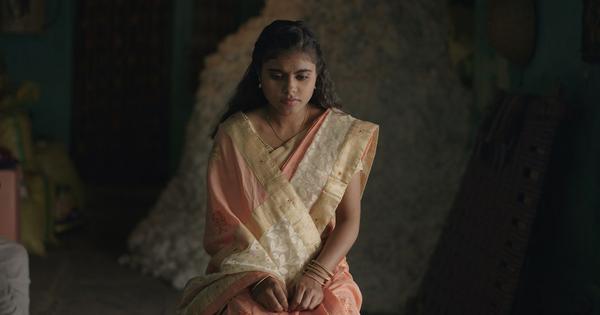A Gritty and Realistic Portrayal of a Deeply Rooted Custom
In India, arranged marriages have long been the norm, shaping the lives of millions of young women. While the tradition is often romanticised in mainstream cinema, Sthal: A Match offers a starkly different perspective. The Marathi-language film, directed by Jayant Digambar Somalkar, provides an unfiltered look at the emotional toll and societal pressure women face during the matchmaking process.
This critically acclaimed film, which has won multiple awards at international film festivals, releases in Indian theatres this Friday. Its raw and powerful storytelling challenges the idealised notion of marriage, depicting it instead as a distressing and often humiliating ordeal for women.
A Story Rooted in Reality
Sthal is set in rural Maharashtra and follows the life of Savita, a young woman determined to pursue higher education and a career. However, in her deeply patriarchal community, marriage is considered the ultimate goal for a woman. Her father, Daulatrao Wandhare, a struggling cotton farmer, sees it as his duty to secure a “good match” for her.
The film effectively juxtaposes Savita’s aspirations with her father’s relentless efforts to arrange her marriage. As he negotiates for a better price for his cotton, he also negotiates for a suitable husband for his daughter—both transactions treated with similar gravity. This parallel serves as a sharp commentary on how women are often viewed as commodities in the arranged marriage system.
The Objectification of Women in Arranged Marriages
One of the most striking aspects of Sthal is its portrayal of how women are assessed like objects during the matchmaking process. The film opens with a dream sequence where Savita imagines herself in a reversed scenario—she and her female relatives scrutinising a nervous prospective groom. They laugh as he fumbles with serving drinks, a moment that highlights the power imbalance in real-life arranged marriage settings.
However, reality hits hard when she wakes up. She is quickly reminded of her place in society as she prepares to be examined by a group of men. Dressed in a sari with her eyes lowered, she sits silently on a wooden stool as the men fire off a list of questions—her name, birth date, education, height, and even her mother’s clan.
Once the interrogation ends, the men step outside for a private discussion. They analyse her skin tone, pointing out that while her face appears fair due to makeup, her elbows reveal her “real” complexion. They criticise her height and debate whether she is suitable. The scene repeats multiple times throughout the film, capturing the repeated rejection and humiliation that Savita endures.
This scenario is painfully relatable to many Indian women. A simple glance at matrimonial ads in newspapers or matchmaking websites reveals a long list of preferred traits for brides—tall, fair, slim, and beautiful. Meanwhile, little attention is given to the groom’s attributes beyond his education and income.
The Burden of Societal Expectations
Savita resists the pressure to marry early. She dreams of completing her studies, passing the civil service exams, and building a career. However, in her village, marriage is seen as the only path to a woman’s security. Her objections carry no weight in a community where parents believe their responsibility ends once their daughter is married.
Actress Nandini Chikte, who plays Savita, describes her character’s ordeal as deeply humiliating. In an interview with the BBC, she revealed that even though she was merely acting, she felt insulted and disrespected each time she had to sit on the stool and be judged by strangers.
This experience resonates with many women in India who are expected to conform to societal norms, sacrificing their ambitions in favour of marriage. The film sheds light on the rigid gender roles that dictate women’s lives, particularly in rural areas where personal aspirations are often secondary to family expectations.

The Enduring Curse of Dowry
Another pressing issue that Sthal addresses is the persistent practice of dowry. Despite being illegal for over six decades, dowries remain an integral part of Indian marriages. The groom’s family often expects gifts of cash, jewellery, and household items, putting immense financial strain on the bride’s parents.
In the film, Savita’s father, already burdened by economic hardship, goes to the extent of putting up a “for sale” sign on his land to afford his daughter’s marriage. His desperation reflects the reality of countless families who take out loans or sell property to meet dowry demands.
The consequences of this practice can be devastating. Every year, thousands of women face domestic violence, harassment, or even death due to insufficient dowry payments. Sthal highlights this brutal reality, portraying how marriage negotiations can turn into a financial transaction where a woman’s worth is measured in material wealth.
A Film Born from Personal Experience
Director Jayant Digambar Somalkar’s inspiration for Sthal comes from his own life. Growing up with two sisters and five female cousins, he witnessed the matchmaking ritual firsthand. At the time, he accepted it as tradition. However, in 2016, when he accompanied a male cousin to meet a prospective bride, his perspective changed.
For the first time, he was on the other side of the process. Watching the young woman sit on a stool while men discussed her physical attributes left him uncomfortable. The experience led him to question the objectification inherent in the tradition, prompting him to explore the topic through cinema.
How Sthal Stands Apart from Other Films on Arranged Marriages
While Indian cinema has frequently depicted arranged marriages, Sthal takes a refreshingly raw and unfiltered approach. Bollywood films often glamourise weddings, portraying them as extravagant celebrations filled with joy, music, and grandeur.
Films like Hum Aapke Hain Koun and Netflix’s Indian Matchmaking cater to a privileged audience where women have greater agency in choosing their partners. However, this representation ignores the struggles of the majority, where marriage is often imposed rather than chosen.
Sthal exposes the harsh reality that many women face, stripping away the romanticised façade to reveal the emotional and social burden placed on them. The film forces audiences to confront the stark contrast between cinematic fantasy and real-life oppression.
A Call for Change
By bringing these issues to light, Sthal aims to spark conversation and challenge long-held traditions. Director Somalkar hopes that the film will push society to rethink the way women are treated in the marriage process. He acknowledges that one film alone cannot change deep-rooted customs overnight, but believes it can serve as a catalyst for dialogue.
The film encourages audiences to question why women must endure such scrutiny while men escape similar judgment. It highlights the need for systemic change, advocating for a society where women can pursue their dreams without being reduced to marriage prospects.
As Sthal releases in Indian theatres, it holds up a mirror to the nation, urging viewers to reflect on the silent suffering of countless women. By challenging the status quo, the film takes a bold step toward redefining societal expectations and pushing for a more equitable future.











